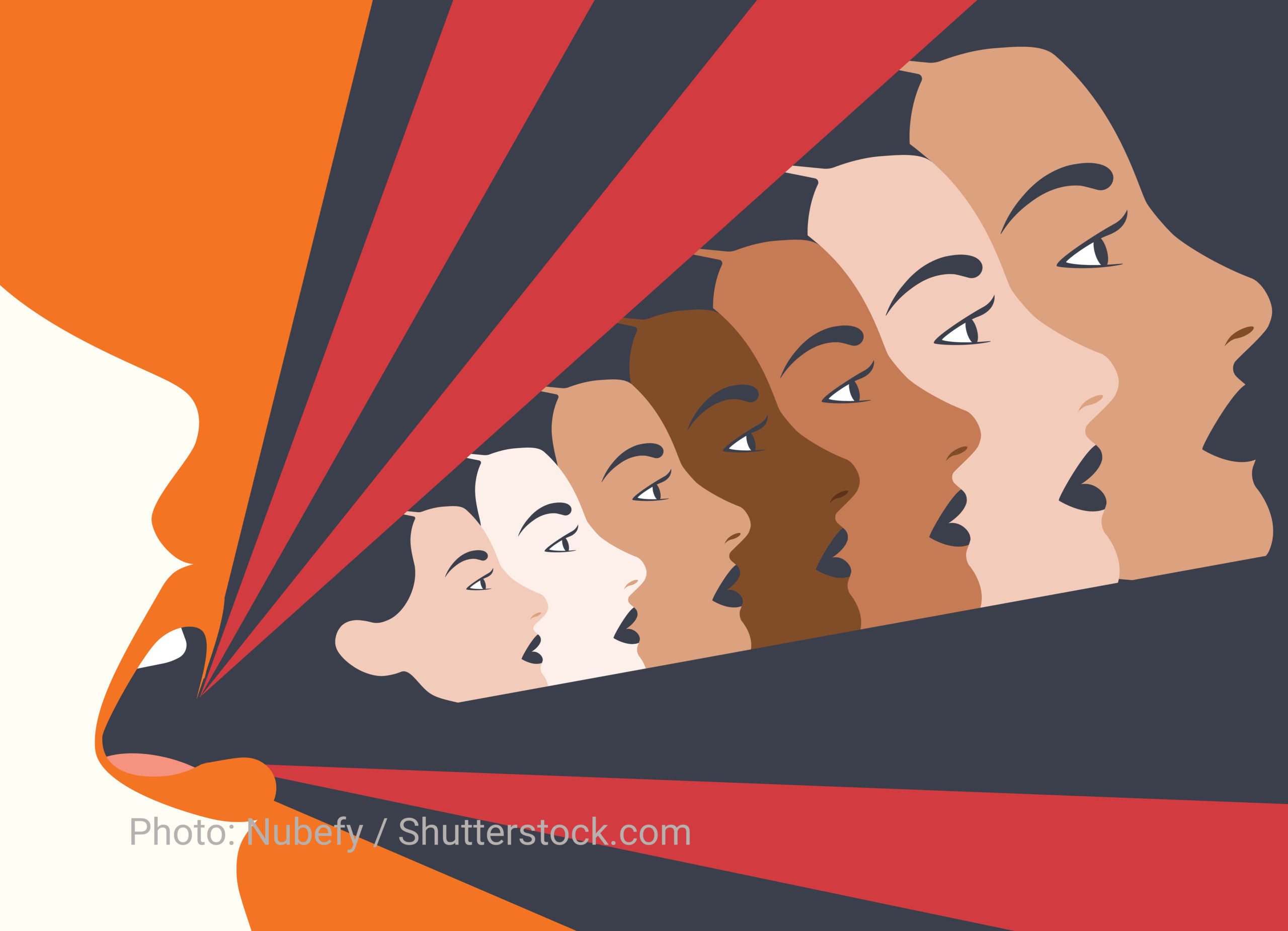With the COVID-19 pandemic, teleworking has become commonplace. Via our webcams, we see our colleagues in a much fuller version of their work selves: we see their spouses or partners in the background, we hear their babies crying. We compare notes on how to function in a meeting while trying to homeschool children or take care of aging parents. The pandemic has revealed another level of our identity in the virtual workplace: that we are parents, children, spouses, partners, and that this brings a whole set of responsibilities beyond those relating to our careers. That we are parents, children, spouses or partners, was, of course, true before; but this part of our identity was far less relevant in the workplace, and usually kept separate from it. The “work-life balance” mantra that has become common in these years describes very well how the two identities – career and personal self – were deemed to be separate in the past, with one necessarily being traded off against the other. But now, after the COVID-19 experience, we know that the workplaces we return to – if we return at all – will be very different from the ones that we left.
Of course, some identities have been accepted within the workplace: it’s rare that a multinational does not oblige its workers to take sensitivity training seminars or brag on its social media channels about how keen it is on diversity. Even here, however, it is usually the companies that call the shots rather than the individuals involved. Employees are either encouraged to leave their identities at the door, or coerced into featuring as tokens in the photos that accompany the annual report. In both cases, however, it is a one-size-fits-all approach: you can have any identities you like, as long as they serve the message.
Is it possible to create professional settings that allow us to go to work as our full selves, without leaving part of our lives at the door or being pushed into whatever identity fits the company’s image? To try and answer this question, we have turned to concept of Convivencia. This a term used by scholars to indicate the ways in which Jews, Muslims and Christians lived together peacefully and in mutual respect in the Iberian Peninsula between the 8th and the 15th centuries. We aim to expand this notion beyond the religious context. We believe that the same concept can be used to address one of the central and most divisive issues of our age: the question of identities.
Identities usually relate to one another in two main ways. The first is via conflict and confrontation – with one trying to impose itself over another. The second is via the idea that to move beyond this confrontation, we have to move beyond identity. This second interpretation suggests that it is necessary to eliminate identities to eliminate identity conflicts. Neither of these approaches are entirely satisfactory. Both assume that affirming identities necessarily leads to conflicts, and that the interaction between identities is always a zero-sum game: for one identity to rise another must fall; for one to win another must lose. Thus, for example, having to identify as a working professional in the office means that we have to set aside our ethnicity, religion, sexuality and other identities. Respect and tolerance may be a first step away from overt hostility, but they have their limits: they require no real exchange, but a mere acceptance of my positioning versus your positioning. No real communication is needed. Moreover, under such a framework out identities are essentially defined by others. Thus, ethnicity or sexuality become products of what others see and decide to indulge. One may or may not consider ethnicity to be relevant in the workplace, but under a tolerance framework one’s personal opinion on this simply does not matter: what does are the subjective perceptions and constructed stereotypes. Though it may be done with the best of intentions – “this person is a different race from me and I shall take care to be sensitive about this” – but it remains an imposition.
The concept of Convivencia proposes an alternative approach, a renewed understanding, a cultural approach that allows us to choose our own identities both in and outside of the workplace, and to know that these will be recognised by those around us. Rather than being obliged to ignore or embody particular identities, each individual is able to choose the identities that they bring into any particular space. If your ethnicity is a part of your working life for you, then you should be free to bring it to work, but you should also recognise that others may decide that theirs is simply not relevant to them at work. Either way, it should be an individual decision made moment-by-moment, rather than one imposed by others. Convivencia is based on the conviction that identities can be celebrated, with a recognition of the dignity and the uniqueness of each identity. To do this, it helps to recognize that none of us has a single identity. In every aspect of our lives, we take on different identities at different times. Nationality (sometimes more than one), gender, religion, social position, political beliefs, education, and more. Social media has also contributed to multiply our potential identities and the interactions between them. In the past, a person may have identified with one or two hobbies or groups they joined. Now the internet has made it is possible to adopt the identity of dozens of online subcultures, moving from one to the next or adopting a grab-bag of tags all at once – one has only to look at the proliferation of hashtags in modern Twitter bios to see the pick-n-mix approach to identity. However, our identities may also come into conflict. Thus, when taking a Zoom call with young children in the room, your identity as a mother may come into conflict with your identity as a businesswoman. The question is, how do we create a culture that enables us to express, display and celebrate the different identities we have?
A good starting point is a reciprocal understanding that if I have the right to celebrate my identities (plural) and their dignity, then this is also true for for all of us. It is in the reciprocal nature of this celebration that Convivencia culture lies. If we all do this, then we do not have to choose between living alongside others and being who we are. This is related to the broader concept of humanism: though there may be many identities that we don’t share, we all share at least one identity, our belonging to the human species. This is the identity that connects all us, making us alike, and yet not the same.
However, it is not enough simply to change the culture within organisations. A culture of Convivencia creates a situation in which identities can be celebrated within an organization, but these identities are also what ties a particular organisation in to the communities that surround it. It is here that the true novelty of the concept lies. In fact, Convivencia and social impact are two sides of the same coin. Convivencia, in other words, is not simply multiculturalism but also multicommunalism. When a company employs, sells to, buys from or otherwise interacts with members of a particular community, that makes it a part of that community. This is not merely a matter of token gestures towards corporate social responsibility. When a company adopts a culture of Convivencia, social impact is not an afterthought but rather at the core of its existence – the company comes to perceive itself as a member of its communities rather than merely interacting them. This relationship is often achieved as a matter of course by small businesses: the local bakery, butcher’s or skate shop, for example. On the other hand, large businesses tend to struggle in achieving the same levels of integration and affection among the communities with which they interact. Convivencia can help to bridge this gap, just because it is impossible to draw a line between internal and external Convivencia. When an organization adopts an internal culture of Convivencia, this automatically revolutionises the organisation’s external relations at the same time.
This means that move into the post-COVID workplace, we will not only be negotiating new modes of interaction between our multiple identities, but we will also be re-evaluating the social contracts that exist between organisations and the communities that surround them: state actors, private companies, international organisations, the third sector.. As multiple actors grow increasingly intertwined, we need to move towards improving the responsibility and accountability of every actor. This has already begun in certain sectors – environmental sustainability, for example – but it also needs to occur at the social level, changing the capacity of organizations to understand and measure their positive or negative effect on society as a whole and on the communities in which they operate. People are increasingly beginning to talk about community capitalism, and by taking such approaches we can gain an entirely new perspective on organizations and communities. These are ecosystems in which many different actors – the managers, the employees and their families, as well as those who procure goods and services through the organization – come together and have to relate. How, then, do we create a space in which all these different actors – which bring with them not just their organizational identities but also their identities as human beings first and foremost – can work and come together?
This will involve effort on the part of organizations, which many are likely to be unwilling to undertake it. Nevertheless, it is important for them to realize that some variety of change is inevitable, and that it is only by embracing it that they will be able to help direct the ways in which the future develops. This could be a good place to start from working to implement and promote the culture of Convivencia within the organizations with which we work.
By bringing the question of identities to the surface and making a careful and considered effort to address the complexity of the relationships between various different identities, there is the possibility that – even in the workplace – identities can come together and can be celebrated without having to be set aside for the good of the organization.
Today we are tasked to imagine more human-centred work environments for people to return to as COVID-19 regulations gradually begin to wind down. Often – and particularly in times of high financial pressure, the goal of maximizing productivity can edge aside other less tangible results. The prevalence of measurable targets can help to make our society more efficient and effective, but we want more from our society. We want to respond to greater challenges than simply maximizing immediate utility. We must remind ourselves to put the cultural aspect at the center of our efforts. At the core of this effort there should always be a humanistic approach and one that allows for different identities to come together and live together without being forced to set aside their individuality.
-
 Gabriele Segre
Gabriele Segre
Director, Vittorio Dan Segre Foundation




